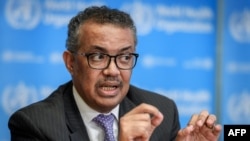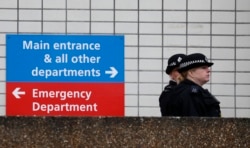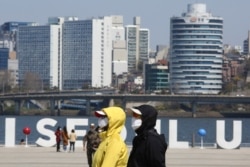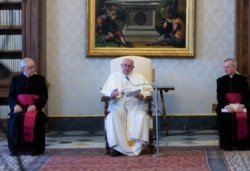World Health Organization Director-General Tedros Adhanom Ghebreyesus warned countries Wednesday that politicizing the global coronavirus crisis could lead to more deaths after U.S. President Donald Trump criticized WHO and threatened to cut off funding for the international public health organization.
In response to the criticism at a news conference in Geneva, Tedros urged countries to avoid politicizing the pandemic “if you don’t want to have more body bags.”
“Now is the time for unity, for the international community to work together in solidarity to stop this virus and its shattering consequences,” Tedros added.
Trump, who has been widely criticized for not reacting more swiftly and aggressively to combat the spread of the virus in the U.S., tweeted Tuesday that “the WHO really blew it” and charged the organization with being “very China centric.” He also said he would consider cutting off millions in U.S. aid to WHO.
More than 13,000 deaths have been reported in the U.S. as of Wednesday, trailing only Italy and Spain, according to Johns Hopkins University statistics.
In New York state, the coronavirus hot spot in the U.S., 779 deaths were reported Wednesday, the state’s highest one-day death toll to date. But Governor Andrew Cuomo said at a news conference Wednesday that social distancing seemed to be working as the number of hospitalized patients has decreased in recent days.
In the United Kingdom, a British official said Prime Minister Boris Johnson was in stable condition Wednesday after spending a second night in the intensive care unit at a London hospital for coronavirus disease treatment.
Junior Health Minister Edward Argar said Johnson was “comfortable and in good spirits.”
The prime minister has been hospitalized since Sunday after his symptoms persisted during a period of self-isolation following his positive coronavirus test.
Britain, which has been under lockdown orders for about two weeks, has about 56,000 confirmed coronavirus cases with 6,100 deaths.
South Korea has not followed many other countries in instituting strict stay-at-home measures but has had success in greatly reducing its number of new virus transmissions with calls for social distancing and closing schools.
The government announced 53 new cases Wednesday, keeping intact a string of similar levels this week.
There have been concerns about the possibility for greater infection numbers in the capital, Seoul, and on Wednesday the city’s mayor announced the closure of bars and night clubs.
South Korea’s Prime Minister Chung Sye-kyun also announced the suspension of visa-free entries for people coming from countries that currently ban entry to South Korean nationals, as well as rules for denying entry to foreigners traveling for non-urgent reasons.
Meanwhile, Norway is joining Austria and Denmark with plans to begin loosening lockdown restrictions.
The government plans to reopen kindergartens on April 20, with other students set to go back to their schools a week later. Norway has about 5,900 confirmed cases.
The World Health Organization’s Europe director cautioned Wednesday against prematurely relaxing measures aimed at stopping the spread of the virus.
“It is the time to once again double and triple our collective efforts to drive towards suppression with the whole support of society,” Hans Kluge told reporters.
In Vatican City, Pope Francis spoke against those who would seek to profit off the pandemic, offering prayers to “convert their hearts.”
While officials in some parts of the United States have pointed to potential signs of hope that rates of infections are slowing, leaders such as New York’s Cuomo say now is not the time to let up on lockdown measures that have helped.
The United States has about 400,000 confirmed cases, more than double the number found in any other nation.
Germany on Wednesday became the fifth country to cross 100,000 cases, joining the U.S., Spain, Italy and France.
The novel coronavirus was first found in China, with the majority of infections there taking place in Hubei province and its capital, Wuhan. That prompted a strict lockdown for about three months until the number of locally transmitted cases subsided.
Tens of thousands of people took to roads, rails and air Wednesday as they finally got government permission to leave Wuhan, provided a mandatory smartphone app shows they are healthy and have not had recent contact with anyone who has the coronavirus.








